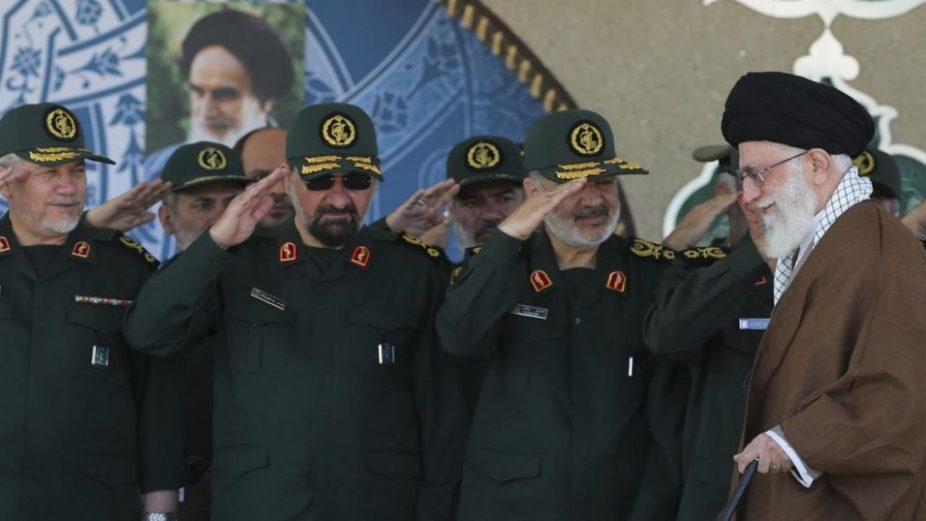By: Simon TisdallSource: The GuardianJan 1, 2018
Like birds of prey circling high in the desert sky, Iran’s many foes and rivals are watching the street protests in Tehran and other cities with beady-eyed anticipation.Hopes that the unrest could trigger regime collapse, voiced openly in the US and Israel, appear premature. But any real or imagined weakening of the Iranian government’s grip could presage a dangerous escalation of regional tensions.Predominantly Shia Muslim Iran’s efforts to project its power across the Middle East have earned it many enemies. Its expansionist policy gathered pace after the strategic cuffs came off at the end of the cold war, and accelerated following the British-American debacle in Iraq after 2003.Iran is now a leading actor in post-Saddam Iraq, Syria and Lebanon. These perceived encroachments are a cause of great resentment, not only in Iraq’s Sunni heartlands to the north and west of Baghdad but especially in the headquarters of Sunni Islam, Saudi Arabia.Iranian officials have already accused the Saudis of fomenting the protests. When Lorestan’s deputy governor blamed “takfiri groups” (Sunni extremists) and “foreign intelligence services”, he was using code for Riyadh.Until recently, the idea that Saudi Arabia was secretly plotting regime change in Iran might have seemed outlandish. But tensions between the two countries are at an all-time high.The Saudis accused Iran of direct responsibility for a recent missile attack on the king’s royal palace in Riyadh. The missile was launched from Yemen, where a Saudi-led coalition is fighting Houthi rebels backed by Tehran.The rivalry extends to Lebanon, where the Saudi crown prince, Mohammed bin Salman, mounted what most observers concluded was a bungled coup in November to reduce the influence of Tehran-backed Hezbollah, the Lebanese Shia political party and militia.In his drive to repulse Iran, knock Qatar and other Arab Gulf states into line, and assert control at home, the youthful Salman has gained a reputation for recklessness. Nobody truly knows how far Salman is prepared to go, although he has vowed in the past “to take the fight to Iran” and has described Iran’s supreme leader, Ayatollah Ali Khamenei, as “the new Hitler of the Middle East”.Salman has the strong backing of his friend Jared Kushner, Donald Trump’s son-in-law and Middle East envoy. Trump’s hostility towards what he calls Iran’s “rogue regime”, and his wish to see it toppled, are no secret.What is a surprise is the sudden eruption of the protests, which had no obvious internal trigger. Trump and Mike Pence, his vice-president, voiced hopes Iran’s “oppressive regime” would fall, ignoring the fact that Hassan Rouhani was democratically re-elected as president less than one year ago.Israeli politicians are also excited about regime change in Iran. The regional cooperation minister, Tzachi Hanegbi, said Iranian protesters were “courageously risking their lives in the pursuit of freedom”, and called on the “civilised world” to support them.But Benjamin Netanyahu, Israel’s prime minister, who has built a career demonising Iran as an existential threat, urged them to pipe down – presumably concerned that Iran’s leaders could turn their wrath on Israel. If Netanyahu fears a backlash, he is probably wise to do so. Unlike Trump and Pence, Israel is in the firing line if matters get out of hand.Israel says Iran has stepped up missile and weapon supplies to Hezbollah in Lebanon and to Palestinian militants in Gaza. It is increasingly worried about the security of its de facto Golan Heights border with Syria. A weakened, wounded Iran could lash out. It could also prove a disruptive, unpredictable partner for both Iraq and Syria, as well as for Turkey and Russia, currently Tehran’s allies of convenience.As for the circling American, Saudi and Israeli hawks, they should be careful what they wish for.

